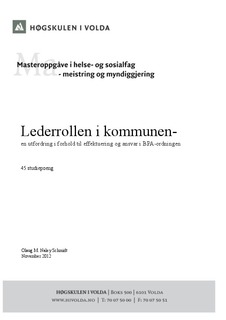| dc.description.abstract | Abstract
Background and Purpose: The topic of this study is about how municipal leaders perceive their role in assistance provisioning decisions in which the services are organized as user-controlled personal assistance (UPA) for adults with mental retardation, who can not be the supervisor of its UPA arrangement. Municipalities have the primary responsibility to provide appropriate services or assistance to people with mental retardation. The purpose of this study is to focus on the municipal leadership role in assistance provisioning decisions for people with mental retardation. Municipal officials have to determine what assistance services the specific user gets, and each municipality is academically responsible for the assistance services offered. In May 2000 UPA were incorporated in the Social Services Act and municipalities are required to have UPA in their repertoire of services. The act is described there as an alternative organization of practical and personal help for people who are severely mentally retarded. In the last ten years there has been a continuous growth in recipients of UPA, from nearly 700 in 2000 to more than 2,500 in 2009. How many of the 2,500 who belong to the group of mentally disabled, who are the target group in this study, is not quantified. The scope and increase of the usergroup can say something about municipal leaders’ challenges, which may be based on management processes, the formulation and implementation of this assistance provisioning decision.
Method: The study describes a qualitative approach with semi-structured interviews of eight mid-level managers in four different municipalities in Norway. As a tool of analysis systematic text condensation is used, as described by Malterud (2011), before the findings are presented and further relates to theoretical perspectives and previous research findings.
Findings: The findings show variation in perception of leadership in assistance provision decisions organized as UPA. Findings show that the perception of the leader role may be related to the employer model municipality has chosen for its UPA. Descriptions of findings is divided into the following topics: Investigation prior to the formal decision, executive insight into the effectuation of the assistance decision, the academic responsibilities role, to be ruled by economics and efficiency considerations and managers training responsibilities.
Summary: Municipal leaders perceive their role in user-controlled personal assistance differently, but agree that structural adaptation to the user group may be required for securing satisfactory services in the future.
Keywords: personal assistance, user involvement, patient participation, mental retardation, leadership, mental retardation | no_NO |
